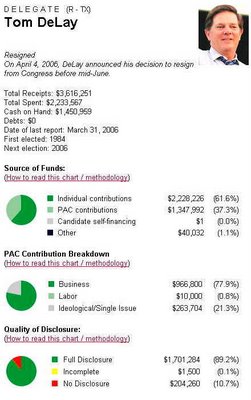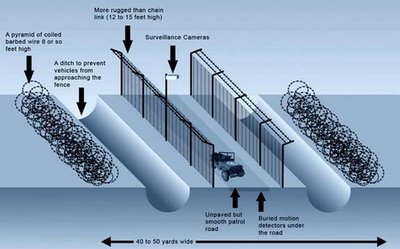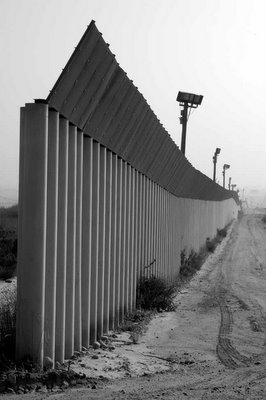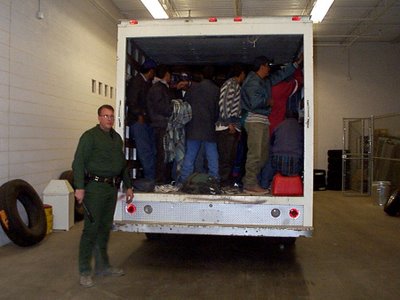Stopping by
Big Lizards, Dafydd makes an
excellent point in his observation of how Congress is reacting to the search of Congressman Jefferson, who has recently been busted in a bribery case (along with a few associates).
Congress, both Republican and Democrat, are up in arms about the search of Congressman Jefferson's office, they ignore the fact that a warrant was issued from a Judge to allow the search after the request to search the premise was denied.
United States Constitution ~ Article I ~ § 6 ~ ¶ 1:
The Senators and Representatives shall receive a compensation for their services, to be ascertained by law, and paid out of the treasury of the United States. They shall in all cases, except treason, felony and breach of the peace, be privileged from arrest during their attendance at the session of their respective Houses, and in going to and returning from the same; and for any speech or debate in either House, they shall not be questioned in any other place.
I am not a lawyer, but this does seem quite clear cut how it is stated.
First, Jefferson has not been charged as of it, so he has not been charged with a felony of bribery yet (though this will most likely change very soon). Congressman Jefferson still states he has done nothing wrong and has stated he will not resign from his office. (no bisurprisese there).
Even though Congressman Jefferson has not been charged with a felony just yet, means he cannot be ARRESTED (Privilege from Arrest) during attendance of sessions of the House, the coming and going from sessions of the House and for any debate or speech related to the House.
This does not say his office are off-limits.
This does not mean that in the process of an investigation that the office of a Congressman cannot be searched in accordance to the law. The Law was followed and a warrant was issued.
Is Congress now saying that the Judicial branch has no right to issue a warrant in the process of an investigation?
Dafydd also makes a very astute observation that the illegal activity of Congressman Jefferson will most likely be eclipsed by the 'outrage' that the President (blame the President) has over-stepped his bound in the search of a Congressman's office (it was the FBI that searched under the legal authority of an investigation and had warrant in hand).
I am now more concerned about the sudden want of immunity from search and seizure in the process of a criminal investigation, when there is a warrant issues by the Judicial branch, that these Congressman seem to think they should have.
Why do they have a need of such secrecy?
Why do they seek to thwart law enforcement in the process of an investigation?
Why do they feel they are above the law?
The more I think on this the more I feel outrage that this Congressman's illegal activity is being eclipsed by these other idiots in Congress 'outrage' of a legal search granted by the Judicial branch.
Does Congress think that they are above the law?
Do they think the Judicial branch has no right to issue a warrant in the process of an investigation of criminal activity of a Congressman?
This should outrage all law abiding Americans to see that instead of upholding the law, Congress seeks to subvert it to their own means.
Resentment boiled among senior Republicans for a second day on Tuesday after a team of warrant-bearing agents from the Federal Bureau of Investigation turned up at a closed House office building on Saturday evening, demanded entry to the office of a lawmaker and spent the night going through his files.
LinkSpeaker of the House Denny Hastert (R-IL), House Majority Leader John Boehner (R-OH), House Minority Whip Steny Hoyer (D-MD), Deputy Majority Whip Eric Canter (R-VA) and many other congressman and senators are up n arms about this. They do not show outrage that one of their own has been caught red-handed in felony bribery, but are outraged at the prospect that FBI had the nerve, the audacity to search a Congressman's office with a warrant!
I think their priorities are screwed up.
I think that perhaps there might be even more corruption in our government officials, and they fear searches into possible illegal activity they would hold at their offices. This is just speculation, but when they ignore the illegal activity of one of their members and show more outrage at a search with warrant of his office, makes me wonder about them.
On a side note, did not Congress complain about warrants not being obtained in investigations of the NSA, yet when one of their own is investigated and office searched with a warrant, they are outraged that it happened at all?
Dafydd reaches a very interesting conclusion on this:
But it would seem that the plain meaning of "they shall in all cases, except treason, felony and breach of the peace, be privileged from arrest during their attendance at the session of their respective Houses, and in going to and returning from the same" is that members of Congress cannot be arrested during a session, or on their way to the session or from it.
It seems a bit of a stretch to say that "privileged from arrest" means "...and you also can't search their offices." (The other part has the plain meaning that you cannot interrogate them about some speech they made.)
Logically, if we were to take their assertions of blanket immunity from search and seizure at face value, then what is the House, from Republican Speaker Hastert down to the lowliest Democratic mouse, saying?
They are saying that if Marion Barry were elected to Congress, he could sit there in his congressional office, in full view of God and Man, openly smoking crack and shooting up heroin... and the FBI, the DEA, and the Capitol Police could only stand helplessly watching. So long as he kept his stash in the office, he needn't even hide it -- because Congress has a private law that says "what happens under the Dome stays under the Dome."
The Times hinted slightly at this with:
Members of Congress are mindful that much of the public is not familiar with the speech and debate clause, which, among other things, requires that lawmakers be "privileged from arrest during their attendance at the session of their respective Houses, and in going to and returning from the same." Many people may wonder why a Congressional office cannot be searched in a criminal case and what members of Congress are complaining about.
While much of the PUBLIC may not be mindful of the clause, I am sure the Judicial branch IS mindful of the clause, and still issued the warrant to search the offices of Congressman Jefferson. It seems the Judicial branch seems to think this clause has nothing to do with the search of a Congressman's office in an investigation and issued a warrant.
But why are we as American Citizens surprised?
We have laws on the books that are not supported or enforced everyday, why should we expect the Law to matter to Congress anyways?
Some Republicans agreed privately that the search was in line with what they saw as the philosophy of the Justice Department in the Bush administration. They said the department had often pushed the limits on legal interpretations involving issues like the treatment of terrorism detainees and surveillance.
Republicans may have a potential self-interest beyond defending the institutional prerogatives of the legislative branch. With some of the party's own lawmakers and aides under scrutiny in corruption inquiries tied to the lobbyist Jack Abramoff and the former lawmaker Randy Cunningham, Republicans would no doubt like to head off the possibility of embarrassing searches of their members' offices.
While they will deny it of course, with so many aides and members under scutiny for lawbreaking, I am sure it is in their own best interest to try and keep law enforcement and investigations out of their offices and out of their files.
"No member is above the law, but the institution has a right to protect itself against the executive department going into our offices," said Representative Steny H. Hoyer of Maryland, the No. 2 Democrat in the House. "We all have in our offices information, letters, correspondence, speeches, etc., that we have written, some of which we may have given to the public, put on the public record, some may not be, which is confidential information, just as the White House has confidential information."
The records obtained are not leaked to the public as it so casually seems to happen from other places like Congress.
Law enforcement should have the right to searching for evidence in an investigation when they have a warrant to do so. If a congressman or aide obstructs law enforcement in the act of an investigation they should be arrested.
"I think it is necessary for us to assert our own prerogatives," said Representative Eric Cantor of Virginia, the deputy Republican whip.
I would be curious as to what he means here in 'assert our own prerogatives.'
Does that means he favors trying to interpret beyond the protections of the clause and try and stretch that to even more protections from liability and prosecution for criminal activity?
He and other officials suggested that the search had been made necessary by a lack of response to an earlier subpoena. "We shouldn't lose sight of the fact that the Department of Justice is doing its job in investigating criminal wrongdoing, and we have an obligation to the American people to pursue the evidence where it exists," Mr. Gonzales said.
When more and more Americans are up in arms about the lack of law enforcement, especially in border security and immigration, the Attorney General will most likely be correct when he states that American people expect law enforcement to do its job and investigate.
See Sanity's related posts:
Culture of Corruption - Part 1Others blogging on this issue:
Big Lizards,
Michelle Malkin,
Expose the Left,
Sister Toldjah,
Riehl World,
Outside the Beltway,
The Moderate Voice,
Strata-Sphere,
Right Wing News,
Leaning Straight Up,
Say Anything











